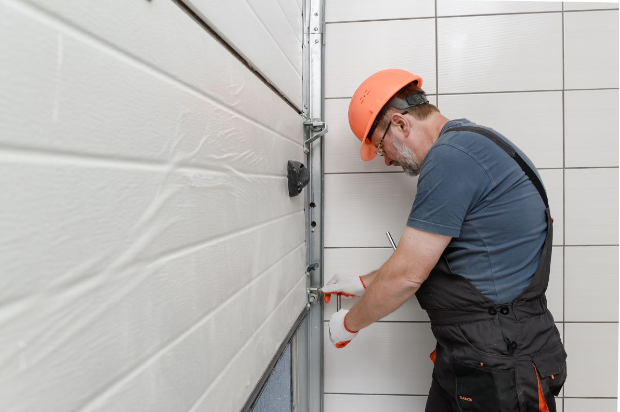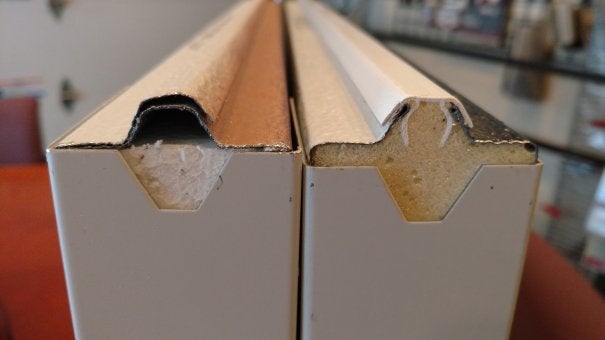-
Understanding R-Value and Why It Is Important

You’re ready to shop for a new garage door and want to make sure you make the best selection. One term that you need to be familiar with is the door’s R-value.
Here’s what you need to know about R-value and how it relates to your garage door.
The Basics of the R-Value
A garage door’s R-value refers to how much insulation the door has. A higher R-value means that the garage door is created from materials that don’t conduct heat well, allowing it to provide high levels of insulation. An R-40 value is considered a high R-value by the US Department of Energy.
Lower R-values mean that the garage door is manufactured from materials that conduct heat well. This means that it does a poor job of providing insulation for your garage.
Why Insulation Matters
Your garage door encloses a space that would otherwise be a large hole in the side of your home.
A garage door with poor insulation qualities will allow the air temperature inside the garage to quickly change temperature, creating a space that’s uncomfortable and expensive to heat and cool.
Selecting a garage door with insulating qualities helps you keep the space at a comfortable temperature and use less energy to do so.
Is a Higher R-Value Always Better?
With R-values, you need to consider the price of the garage door and how much more efficient a high R-value is at insulating your garage.
Insulation R-values adhere to the law of diminishing returns. This means that as you increase the R-value, the amount of additional insulation gradually gets smaller and smaller.
For example, an R-16 garage door isn’t twice as effective at offering insulation as an R-8 garage door.
Instead, an R-16 door provides a 5 percent improvement in energy efficiency. An R-32 garage door is 7 percent more energy efficient than an R-8 product.
For garages that are heated or cooled, look for an R-9 to R-13 garage door. If a garage functions as a living space, an R-13 garage door is ideal.
Purchase Your New Garage Door
Thomas V. Giel Garage Doors, Inc. offers a wide selection of commercial and residential garage doors, as well as installation and maintenance services. Contact us at 724-443-1437 or visit us online to get started!
-
Polyurethane vs Polystyrene for Garage Door Insulation
Insulation in your residential or commercial garage door is essential if you want to make sure you keep the cold temperatures out of your house. There are two main types of insulation which are Polyurethane and Polystyrene.

Polyurethane
Polyurethane (right) is a polymer composed or organic units joined by urethane links. They were first made by Otto Bayer and his coworkers at IG Farben in Leverkusen, Germany in 1937. It is mostly used in construction, car seating, and furniture but it is used in many other applications.
Polyurethane is sprayed into each panel and makes a very tight fit which will add to the rigidity of the panel when it is new giving it a higher R-Value .
Polyurethane is the more expensive material of the two but doesn’t usually add too much more money to the price of the door. It is important to make sure that the steel skins of the door are not too thin because two things could happen. One, the door will dent easily or two, small waves will appear across the sections and can generally be seen within five feet. This will obviously make the door not look so hot.
Polystyrene
Polystyrene (left) is a synthetic aromatic polymer made from the monomer styrene which is also known as Styrofoam. It is the white brittle material that is frequently used in shipping to protect the goods inside.
Polystyrene is pre-formed to the steel panels and is usually glued to both the front and back of the inside of the panel. It maintains it shape and fits better than open cell polyurethane over a long period of time and does not degrade, deform, or lose R-Value. Most manufactures use closed cell polyurethane negating many of the positives mentioned.
Polystyrene does not fit as tightly as the urethane foam in the end corners of each panel, leaving air pockets. Some manufacturers do not glue their polystyrene to the panels so it does not add to the stiffness of the panels. Generally, this foam results in a lower R-Value for the door.
Of the two materials, polyurethane is the better material. It does have a slight price increase and it’s up to you to decide if it is worth it or not. Regardless, getting insulation is a good choice no matter which material you use.
Thomas V. Giel Garage Doors serves a 50-mile radius around Pittsburgh. We handle all your needs when it comes to garage doors! We serve residential and commercial, and our maintenance programs help make sure your garage doors work over long periods of time. Contact us today!
